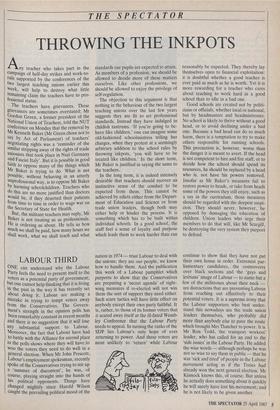LABOUR THIRD
ONE can understand why the Labour Party feels the need to present itself to the voters as a potential party of government; but one cannot help thinking that it is living in the past in the way it has recently set about doing it. Labour are making a mistake in trying to tempt voters away from the Conservatives. The Govern- ment's strength in the opinion polls has been remarkably constant in recent months and there is no suggestion that it will lose any substantial support to Labour. Moreover, the fact that Labour have had to battle with the Alliance for second place in the polls shows where they will have to woo the voters they need to do well in a general election. When Mr John Prescott, Labour's employment spokesman, recently spoke of the Conservatives trying to stir up a 'summer of discontent', he was, of course; playing straight into the hands of his political opponents. Things have changed mightily since Harold Wilson caught the prevailing political mood of the nation in 1974 — trust Labour to deal with the unions; they are our people, we know how to handle them. And the publication this week of a Labour pamphlet which purports to show that the Conservatives are preparing a 'secret agenda' of right- wing measures if re-elected will not win them the sort of support they need either. Such scare tactics will have little effect on anybody except their own party faithful. It is, rather, to those of its former voters that it scared away itself at the ill-fated Wemb- ley Conference that the Labour Party needs to appeal. In turning the ranks of the SDP lies Labour's only hope of ever returning to power. And these voters are most unlikely to 'return' while Labour continue to show that they have not put their own house in order. Extremist par- liamentary candidates, the controversy over black sections and the 'gays and lesbians' image of Labour — to name but a few of the millstones about their neck are distractions that are preventing Labour from reaching out effectively to their potential voters. It is a supreme irony that the Labour supporters who best under- stand this nowadays are the trade union leaders themselves, who probably did more than anybody else to pave the route which brought Mrs Thatcher to power. It is Mr Ron Todd, the transport workers' leader, who has called for an end to the `side issues' in the Labour Party. He added the wise words — although perhaps he was not so wise to say them in public — that he was 'sick and tired' of people in the Labour movement acting as if the Tories had already won the next general election. Mr Kinnock knows this, of course. But unless he actually does something about it quickly he will surely have lost his movement; and he is not likely to be given another.


































































 Previous page
Previous page